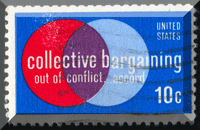 Earlier this month, New York’s Appellate Division, First Department affirmed a New York County Supreme Court, Commercial Division judgment vacating an arbitration award for manifest disregard of the law under the Federal Arbitration Act. See Citigroup Global Markets, Inc. v. Fiorilla, No. 14-747, slip op. (1st Dep’t April 9, 2015). The Court’s characteristically brief opinion does not delve very deeply into the facts or explain the Court’s reasoning in detail, but there’s enough there to make the decision worth noting.
Earlier this month, New York’s Appellate Division, First Department affirmed a New York County Supreme Court, Commercial Division judgment vacating an arbitration award for manifest disregard of the law under the Federal Arbitration Act. See Citigroup Global Markets, Inc. v. Fiorilla, No. 14-747, slip op. (1st Dep’t April 9, 2015). The Court’s characteristically brief opinion does not delve very deeply into the facts or explain the Court’s reasoning in detail, but there’s enough there to make the decision worth noting.
The Court affirmed the trial court’s order vacating the award because the arbitrators apparently denied without explanation one of the parties’ motions to enforce a settlement even though the moving party informed the arbitrators of controlling, New York case law requiring the enforcement of settlement agreements. “Although,” said the Court, “arbitrators have no obligation to explain their awards, when a reviewing court is inclined to hold that an arbitration panel manifestly disregarded the law, the failure of the arbitrators to explain the award can be taken into account.” Slip op. at 1 (citing and quoting Matter of Spear, Leeds & Kellogg v. Bullseye Sec., 291 A.D.2d 255, 256 (1st Dep’t 2002) (quotations omitted)).
While the Court does not directly address the question, it appears that the case arose under the Federal Arbitration Act, because cases interpreting arbitration statute (CPLR Article 75) do not recognize “manifest disregard of the law” as a ground for vacating an award. Under Article 75, the only “outcome review” standards are those that permit vacatur of awards that are irrational, violate a strong public policy or exceed clearly an express limitation on the arbitrators’ authority. See, e.g., Wein & Malkin LLP v. Helmsley-Spear, Inc., 6 N.Y.3d 471, 477-78 (2006); Matter of New York City Transit Auth. v. Transport Workers’ Union of Am., 6 N.Y.3d 332, 336 (2005).
New York cases interpreting the Federal Arbitration Act, however, recognize manifest disregard as a ground for vacating an award. While New York state courts need defer only to the United States Supreme C0urt on federal-law questions, the New York Court of Appeals has traditionally tended to follow established Second Circuit precedent on such issues in Federal Arbitration Act cases. Since the Second Circuit recognizes manifest disregard of the law as a ground for vacating an award under Section 10 of the Federal Arbitration Act, so too have the New York State courts, even though the U.S. Supreme Court has left the question open. See Hall Street Associates, LLC v. Mattel, Inc., 128 S. Ct. 1396, 1403 (2008); see, e.g., T. Co Metals v. Dempsey Pipe & Supply, 592 F.3d 329, 339-40 (2d Cir. 2010) (manifest disregard of the law survives Hall Street); Wein, 6 N.Y.3d at 480-81 (pre-Hall Street New York Court of Appeals follows Second Circuit authority on manifest disregard of the law in Federal Arbitration Act governed case); Tullett Prebon Financial Serv. v. BGC Financial, L.P., 111 A.D.3d 480, 481-82 (1st Dep’t 2013) (applying manifest disregard of the law standard to Federal Arbitration Act governed case post-Hall Street).
One question the First Department decision prompts is whether resort to manifest disregard of the law was even necessary. The U.S. Supreme Court has unequivocally endorsed post-Hall Street what some refer to in shorthand as the “manifest disregard of the agreement” standard, or “essence from the agreement” standard, under which a court may vacate an award where the arbitrators do not even arguably interpret the agreement. See Oxford Health Plans LLC v. Sutter, 133 S. Ct. 2064, 2098 (2013); Stolt-Nielsen, S.A. v. AnimalFeeds Int’l Corp., 130 S. Ct. 1758, 1767 (2010).
Presumably what happened in this case (though the opinion does not say) is that the parties had an agreement that contained an arbitration agreement, and the dispute arose out of or related to that main agreement. One or both parties demanded arbitration, the parties agreed to settle and one of the parties sought to enforce that agreement, which obviously arose out of or related to the main agreement, and was within the scope of issues that the parties agreed to submit and submitted to arbitration.
Under these circumstances it makes little sense to say that the manifest disregard of the agreement standard does not apply because the agreement that was manifestly disregarded was not the main agreement. And if, as the Court said, the arbitrators simply denied the motion to enforce the settlement agreement without comment, it seems to us that it did not even arguably interpret the settlement agreement and thus manifestly disregarded the parties’ agreement.
The opinion, however, relies solely on manifest disregard of the law. Given the uncertainty surrounding whether manifest disregard is a viable ground for vacatur, and the corresponding certainty that manifest disregard of the agreement is a valid basis for vacating an award under Section 10(a)(4) of the Federal Arbitration Act, that sole reliance has the potential to cause relying solely on that standard without any explanation might confuse litigants who are not well-versed in Federal Arbitration Act practice and procedure. We are quite certain, however, that was not the Court’s intention, and there may well be good reasons why the court did not rely on manifest disregard of the agreement as at least an alternative basis for its sound conclusion.
Photo Acknowledgements:
All photos used in the text portion of this post are licensed from Yay Images and are subject to copyright protection under applicable law. Text has been added to both images. Hover your mouse pointer over any image to view the Yay Images abbreviation of the photographer’s name.
















